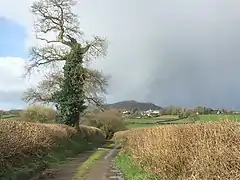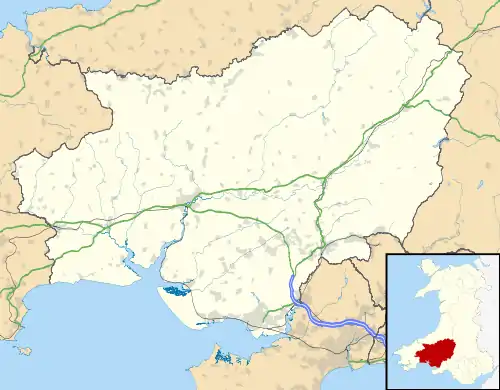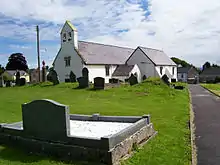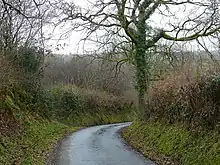Llansadwrn
Llansadwrn (/lænˈsædɜːrn/; Welsh: [ɬanˈsadʊn]; ![]() Welsh pronunciation) is a small village and community in Carmarthenshire, Wales.
Welsh pronunciation) is a small village and community in Carmarthenshire, Wales.
| Llansadwrn | |
|---|---|
 | |
 Llansadwrn Location within Carmarthenshire | |
| Population | 517 (2011)[1] |
| Community |
|
| Principal area | |
| Ceremonial county | |
| Country | Wales |
| Sovereign state | United Kingdom |
| Post town | Llanwrda |
| Postcode district | SA19 8 |
| Dialling code | 01550 |
| Police | Dyfed-Powys |
| Fire | Mid and West Wales |
| Ambulance | Welsh |
| UK Parliament | |
| Senedd Cymru – Welsh Parliament | |


It is located in the countryside above the valley of the River Tywi, about halfway between Llandovery (Welsh: Llanymddyfri) to the north-east, and Llandeilo to the south-west. It is just off the A40 road, between Carmarthen (about 20 miles SW) and Brecon (about 25 miles E). The community is bordered by the Carmarthenshire communities of Cynwyl Gaeo, Llanwrda, Myddfai, Llangadog, Manordeilo and Salem, and Talley.
History
According to tradition, it was founded by an early Christian saint, Sadwrn (fl. around 460).
Four miles to the west of the village are the ruins of Talley Abbey (Welsh: Abaty Talyllychau).
One mile to the west is the hamlet of Waunclunda, and above Waunclunda is an ancient fort. Little information is available about this fort, but it is believed to have been an Iron Age and then a Roman fort. It is believed to be important for its potential archaeology.[2]
The village is also believed to be the site of an important manor, Abermarlais Castle a fortified mansion, built in about the C14 (Rees 1932), it was home to Sir Rhys ap Gruffydd who commanded the Welsh at Crécy (Jones 1987, 4). In the 1600s it was noted to have had 21 hearths - making it a notable house.[3] Also in the village is a Bronze age standing stone and Roman road.
References
- "Community population 2011". Retrieved 13 April 2015.
- Stuff, Good. "Fan Camp, Llansadwrn, Carmarthenshire (Sir Gaerfyrddin)". ancientmonuments.uk. Retrieved 21 January 2019.
- "Archaeology in Wales - Ymddiriedolaeth Archaeolegol Dyfed - Dyfed Archaeological Trust". www.dyfedarchaeology.org.uk. Retrieved 21 January 2019.
External links
| Wikimedia Commons has media related to Llansadwrn. |
- www.geograph.co.uk : photos of Llansadwrn and surrounding area
- https://www.llansadwrn.org.uk/ community website
- https://ancientmonuments.uk/129563-fan-camp-llansadwrn#.XEX4xlz7S00